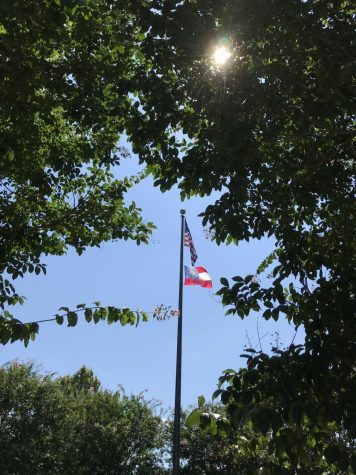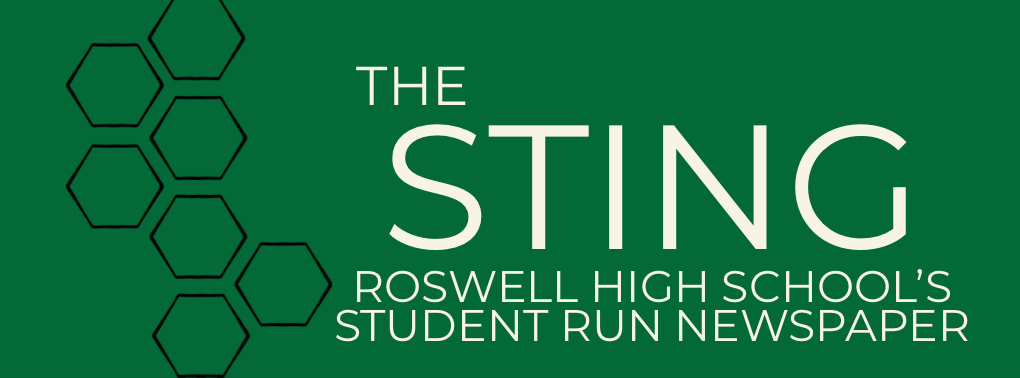The choice to stand for the Pledge: a symbol of American freedom
January 25, 2020
“I pledge allegiance to the flag of the United States of America and to the Republic for which it stands, one nation under God, indivisible, with liberty and justice for all.” Most Americans know these words by heart and have recited them since Kindergarten. All across the country, students stand, turn to the flag, place their hand over their heart and pledge their allegiance to the country. However, it is not required of the students to say the Pledge because it would violate their First Amendment rights.
Years ago, refusing to say the Pledge wasn’t even an option available to students. Until 1943, all students had to say the Pledge. The West Virginia State Board of Education vs. Barnette case decided that students could choose if they wanted to participate in the Pledge or not. I did not know that students didn’t have to say the Pledge and only began noticing students refusing to say the Pledge in the past year. In elementary and middle school, the Pledge was just a daily part of the morning announcements. High schools are different. Students have access to the technology and communication needed to learn about the events in our country. They no longer blindly follow their teachers but make conscious decisions about whether to participate or not.
Why would students have any reason not to say the Pledge? One student said that they do not say the Pledge because they do not want to pledge allegiance to a country that claims to be free for all when in reality, it is not. The student also explains that the inclusion of “under God” does not seem to be separating church and state, with which they disagree. The student continues, saying “it has nothing to do with the troops and it has everything to do with conditioning the general public to feel they owe allegiance to a country that will only fully support you if you are a certain way.”
There are many arguable reasons why students choose not to pledge, but people may be surprised to learn of a different, disturbing trend. Students are too lazy to stand and say the Pledge, so their classrooms stay silent. One student said the reason they don’t participate is because they “don’t feel like standing up.” However, the most saddening of these results is that there are students who wish to say the Pledge, but feel insecure or intimidated by the large, still classrooms.
“I feel self conscious for saying the Pledge out loud because it’s so quiet in my class,” says sophomore Anna Mullen.
Another student, sophomore Gabe Ilenda, says that he would say the Pledge but doesn’t “want to be the only one.”
In an anonymous survey conducted of more than 50 students at Roswell High School, only 75% of participants said that they say the Pledge. 30% of students don’t think it’s important to say the Pledge every morning. This is concerning because the younger generations have lost some of their patriotism. In this day and age, many people are turned off of the U.S. because of Trump, or Hillary, or police brutality, or whatever it may be. The Pledge is not pledging allegiance to any of these people or things, but promising devotion to your country and home, as well as dedicating yourself to resolving the turmoil within America.
On Veteran’s Day, Principal Dr. Shaw read out the names of veterans at our school, or of teachers’ loved ones who have served. My first period teacher had the names of her family members read over the intercom. I was brought almost to tears after hearing the names, thinking of my own grandfather, great-grandfathers, and cousin, who have fought for our country. After the reading of the names and moment of silence, it was time for the Pledge. I assumed that, surely, on a day as moving as this one, that more students would say the Pledge than on a usual day. I was mistaken. Just two people in the classroom said the Pledge: my teacher and I.
These results led me to believe that in this new age, patriotism is outdated, dying off with the World War II, Korean War, and Vietnam War veterans.
However, I began to think about this further. I know that patriotism is not dead. People still wear red, white and blue, wave the American flag, place their hand over their heart for the National Anthem. Yes, there are people who kneel for the Anthem, who use their freedom of speech to protest what they think is wrong. They are exercising their rights, however disrespectful and unpatriotic to some, in order to create a better country, for which they can be proud.
This is the beautiful thing about America. You can believe, practice and speak whatever you want. You can disagree with the President; you can agree with the President. Patriotism might seem old-fashioned to the public justice-advocating students of the day, but, in fact, it is the opposite. Patriotism is evolving and changing before our eyes to include people of all types. There are many things to hate in this country and modern world, but there are so, so many things to love. Saying the Pledge, or not saying it, is just one of the wonderful freedoms of America.

I say the Pledge with pride every morning, out of duty to my country and appreciative reverence for our veterans, but you may not! And that’s okay, because the United States of America provides “liberty and justice for all.”


Mrs Guy Benson • Jan 28, 2020 at 3:28 pm
Thank you for writing the article about the Pledge.
I appreciate your observations and I appreciate your leadership in reciting the Pledge.